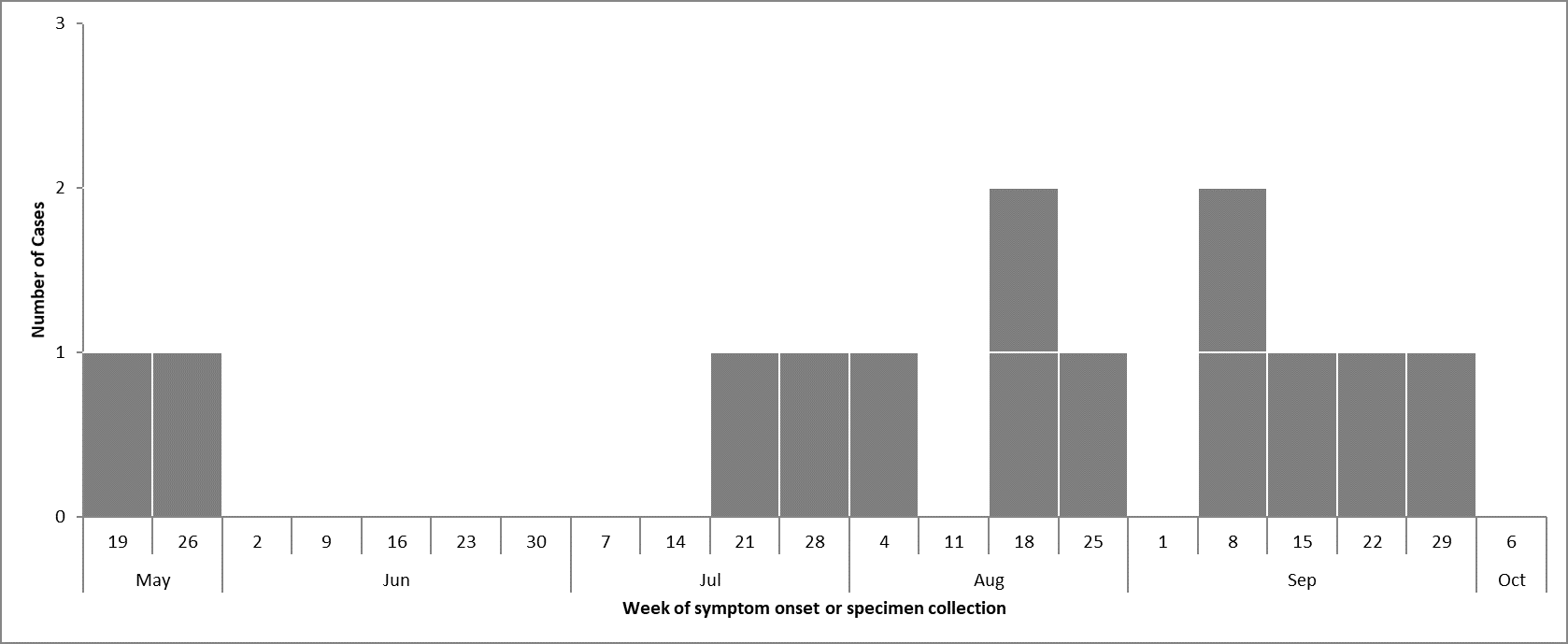Public Health Notice — Outbreak of Salmonella illnesses linked to Filicetti brand Italian Style mild, dry, cured sausage
December 23, 2019 - Final Update
This notice has been updated to advise that the outbreak appears to be over and the outbreak investigation has been closed.

On this page
- Why you should take note
- Investigation summary
- Who is most at risk
- What you should do to protect your health
- Symptoms
- What the Government of Canada is doing
- Epidemiological information
- Additional information
- Media contact
- Public inquiries
- Investigation history
Why should you take note
The Public Health Agency of Canada (PHAC) collaborated with provincial public health partners, the Canadian Food Inspection Agency (CFIA) and Health Canada to investigate an outbreak of Salmonella infections that occurred in Ontario and Quebec. The outbreak appears to be over, and the outbreak investigation has been closed.
Based on the investigation findings, exposure to Filicetti brand Italian Style mild, dry, cured sausage was identified as a source of the outbreak. Some of the individuals who became sick reported eating Filicetti brand Italian Style mild, dry, cured sausage before their illnesses occurred. Other ill individuals reported regularly consuming Filicetti brand dry sausages before getting sick.
On October 16, 2019, the CFIA issued a food recall warning for various ready-to-eat dry sausage products that tested positive for Salmonella, including Filicetti brand Italian Style mild, dry, cured sausage.
Following the October 16th recall, additional laboratory testing of a food sample of Filicetti brand Italian Style mild, dry, cured sausage was completed. Laboratory analysis has determined that both the recalled Filicetti brand sausage product and the ill individuals in Ontario and Quebec have the same genetic strain of Salmonella.
During the food safety investigation, the CFIA identified additional affected products and issued updated food recall warnings on October 17, 2019 and November 5, 2019. For additional details on all recalled product names and lot codes, please consult CFIA's website.
Canadians are advised not to eat any of the recalled products or any foods containing the recalled products. Food service establishments are advised not to sell or serve any recalled products, or any items that may have been prepared or produced using recalled products.
Investigation summary
In total, there were 13 confirmed cases of Salmonella Litchfield illness reported in two provinces: Ontario (11) and Quebec (2). Individuals were sick between May and October 2019. One individual was hospitalized. No deaths were reported. Individuals who became ill were between 4 and 81 years of age. The majority of cases (54%) were female.
The collaborative outbreak investigation was initiated because of an increase of Salmonella Litchfield illnesses being reported. This is a rare strain of Salmonella not commonly seen in Canada.
Who is most at risk
Anyone can become sick with a Salmonella infection, but infants, children, seniors and those with weakened immune systems are at higher risk of serious illness because their immune systems are more fragile.
Most people who become ill from a Salmonella infection will recover fully after a few days. It is possible for some people to be infected with the bacteria and to not get sick or show any symptoms, but to still be able to spread the infection to others.
What should you do to protect your health
Although the outbreak appears to be over, Canadians are reminded to:
- Check to see if you have any recalled ready-to-eat dry cured sausage products in your home. If you do, do not eat them.
- Throw recalled products out immediately and properly wash and sanitize any containers that were used to store these products before using them again.
- If you have any ready-to-eat dry cured sausage products without the original packaging and are unsure if these products are included in this advice, throw them out just to be safe.
- Wash your hands with soap and warm water for at least 20 seconds immediately following contact with any of the recalled products.
- Do not prepare food for other people if you think you are sick with a Salmonella infection or suffering from any other contagious illness causing diarrhea.
Symptoms
Symptoms of a Salmonella infection, called salmonellosis, typically start 6 to 72 hours after exposure to Salmonella bacteria from an infected animal, person or contaminated product.
Symptoms include:
- fever
- chills
- diarrhea
- abdominal cramps
- headache
- nausea
- vomiting
These symptoms usually last for four to seven days. In healthy people, salmonellosis often clears up without treatment. In some cases, severe illness and hospitalization may occur. In some cases, antibiotics may be required. People who are infected with Salmonella bacteria can be infectious from several days to several weeks. People who experience symptoms, or who have underlying medical conditions, should contact their health care provider if they suspect they have a Salmonella infection.
What is the Government of Canada doing
The Government of Canada is committed to food safety. The Public Health Agency of Canada leads the human health investigation into an outbreak and is in regular contact with its federal, provincial and territorial partners to monitor the situation and to collaborate on steps to address an outbreak.
Health Canada provides food-related health risk assessments to determine whether the presence of a certain substance or microorganism poses a health risk to consumers.
The Canadian Food Inspection Agency conducts food safety investigations into the possible food source of an outbreak.
The Government of Canada will continue to update Canadians if new information related to these investigations becomes available.
Epidemiological information
Figure 1 below is an epidemiological curve for this outbreak. Outbreak investigators used this information to show when illnesses began, when they peaked, and when they trailed off. It can take several weeks from the time a person becomes ill to when the illness is reported and testing confirms a link to the outbreak. Data are available for 13 cases.
Figure 1: Number of people infected with Salmonella Litchfield

Text description
| Week of symptom onset or specimen collection | Number of cases |
|---|---|
| 2019-05-19 | 1 |
| 2019-05-26 | 1 |
| 2019-06-02 | 0 |
| 2019-06-09 | 0 |
| 2019-06-16 | 0 |
| 2019-06-23 | 0 |
| 2019-06-30 | 0 |
| 2019-07-07 | 0 |
| 2019-07-14 | 0 |
| 2019-07-21 | 1 |
| 2019-07-28 | 1 |
| 2019-08-04 | 1 |
| 2019-08-11 | 0 |
| 2019-08-18 | 2 |
| 2019-08-25 | 1 |
| 2019-09-01 | 0 |
| 2019-09-08 | 2 |
| 2019-09-15 | 1 |
| 2019-09-22 | 1 |
| 2019-09-29 | 1 |
Additional information
Media contact
Public Health Agency of Canada
Media Relations
613-957-2983
Public inquiries
Call toll-free: 1-866-225-0709
Email: info@hc-sc.gc.ca
Investigation history
Public Health Notice - October 23, 2019
Why should you take note
The Public Health Agency of Canada (PHAC) is collaborating with provincial public health partners, the Canadian Food Inspection Agency (CFIA) and Health Canada to investigate an outbreak of Salmonella infections occurring in Ontario and Quebec. The outbreak appears to be ongoing, as recent illnesses continue to be reported to PHAC.
Based on the investigation findings to date, exposure to Filicetti brand Italian Style mild, dry, cured sausage has been identified as a source of the outbreak. Some of the individuals who became sick reported eating Filicetti brand Italian Style mild, dry, cured sausage before their illnesses occurred. Other ill individuals reported regularly consuming Filicetti brand dry sausages before getting sick. The investigation is ongoing, and it is possible that other sources could be identified.
On October 16, 2019, the CFIA issued a food recall warning for various ready-to-eat dry sausage products that tested positive for Salmonella, including Filicetti brand Italian Style mild, dry, cured sausage.
Following the October 16th recall, additional laboratory testing of a food sample of Filicetti brand Italian Style mild, dry, cured sausage was completed. Laboratory analysis has determined that both the recalled Filicetti brand sausage product and the ill individuals in Ontario and Quebec have the same genetic strain of Salmonella.
The CFIA has since identified additional affected products and has issued an updated food recall warning. For additional details on all recalled product names and lot codes, please consult CFIA's website.
Canadians are advised not to eat any of the recalled products or any foods containing the recalled products. Food service establishments are advised not to sell or serve any recalled products, or any items that may have been prepared or produced using recalled products.
The CFIA is continuing its food safety investigation, which may lead to the recall of other products. If additional products are recalled, the CFIA will notify the public through updated food recall warnings.
This public health notice will be updated as the investigation evolves.
Investigation summary
As of October 23, 2019, there are 12 confirmed cases of Salmonella Litchfield illness in the following provinces: Ontario (10) and Quebec (2). Individuals became sick between May and September 2019. One individual was hospitalized. No deaths have been reported. Individuals who became ill are between 4 and 81 years of age. The majority of cases (58%) are female.
The collaborative outbreak investigation was initiated because of an increase of Salmonella Litchfield illnesses being reported. This is a rare strain of Salmonella not commonly seen in Canada.
It is possible that more recent illnesses may be reported in the outbreak because there is a period of time between when a person becomes ill and when the illness is reported to public health officials. For this outbreak, the illness reporting period is between 4 and 5 weeks.